Key takeaways:
- Understanding abuse trauma support requires acknowledging survivors’ feelings and building a foundation of trust and empathy in their healing journey.
- Self-reflection and journaling are powerful tools that help survivors connect with their emotions, track progress, and gain insights into their needs and personal growth.
- Creating a consistent and flexible journaling routine can enhance the clarity and effectiveness of the writing process, making it a safe space for emotional exploration.
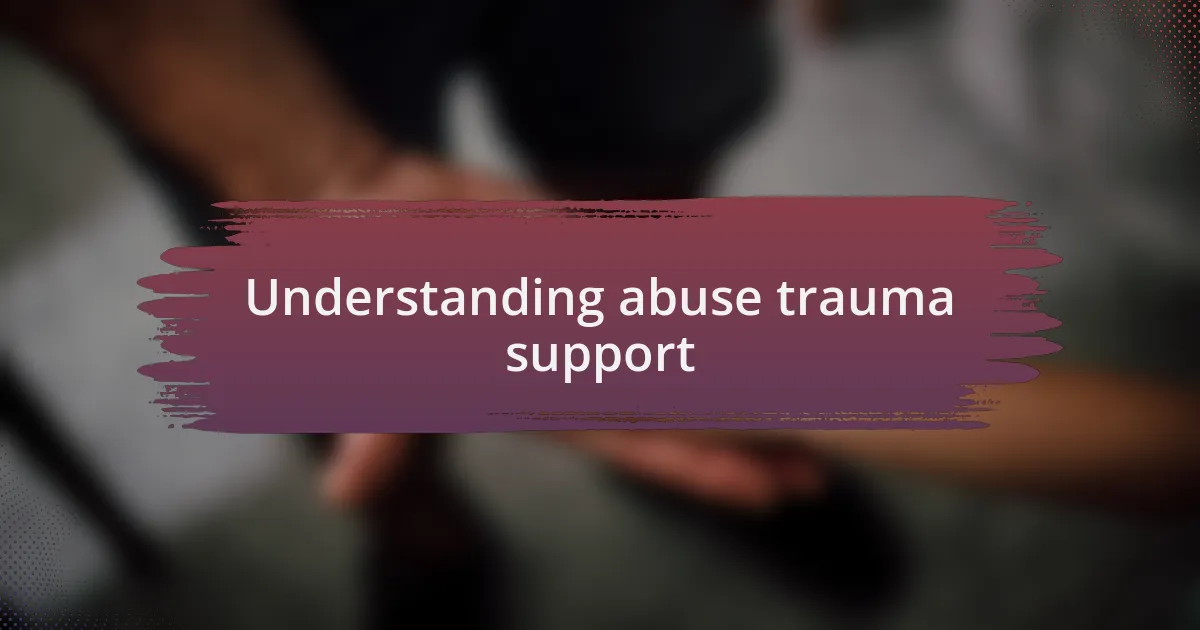
Understanding abuse trauma support
Understanding abuse trauma support involves recognizing the deep, often hidden scars that trauma leaves behind. I remember discussing with a friend who had experienced emotional abuse, and she shared how she felt invisible and unheard for so long. It dawned on me then that those feelings are common—many survivors grapple with the lingering impact of their experiences, and acknowledging this is the first step in their healing journey.
The support system for abuse trauma is multifaceted and deeply personal. I once attended a group session where everyone shared their stories, and I realized just how powerful shared experiences can be. It made me question: how can we cultivate environments where survivors feel safe to express themselves? Building a foundation of trust and empathy is crucial in offering the right support, allowing individuals to explore their pain and resilience without judgment.
Additionally, it’s important to remember that abuse trauma support is not a one-size-fits-all approach. I’ve witnessed people finding solace in different methods, whether through therapy, community support, or creative outlets like art or writing. This diversity in healing paths emphasizes that each survivor’s journey is uniquely tailored to their needs, reminding us that understanding and compassion are indispensable in this process.
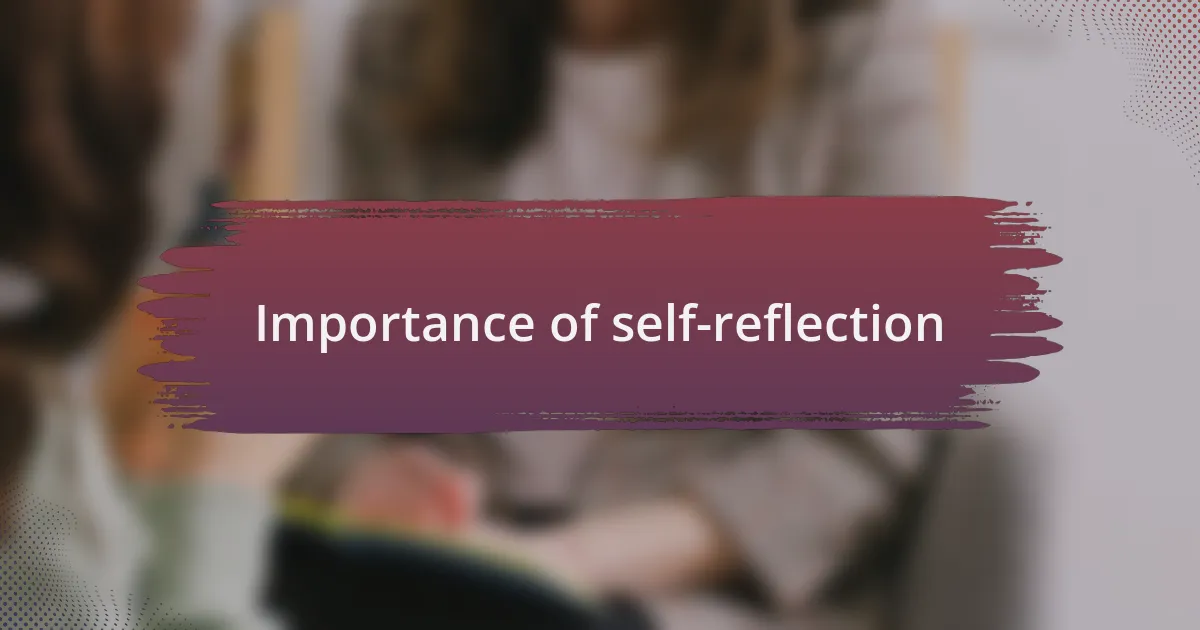
Importance of self-reflection
Self-reflection is a powerful tool for anyone navigating their trauma journey. I recall a moment when I took time to pause and write about my feelings after a particularly tough day. As I poured my thoughts onto the pages, I began to understand the patterns in my emotions—what triggered me and how I usually responded. It’s almost like holding a mirror up to my soul, revealing the shapes and shadows that had been clouding my mind.
The process of self-reflection allows survivors to connect the dots between their past experiences and present struggles. I often ask myself, “What is this feeling trying to teach me?” This question opens a dialogue with my emotions rather than suppressing them. When I embraced this dialogue, it became easier to confront painful memories and move towards healing. It feels liberating to give voice to what I had buried for so long.
Moreover, self-reflection cultivates a deeper understanding of one’s needs and desires. Through journaling, I’ve uncovered facets of myself that I had neglected—my joy in creativity or my need for boundaries. It’s astonishing to think about how these realizations have influenced my personal growth. I genuinely believe that self-reflection not only fosters clarity but also enhances our capacity for compassion, both towards ourselves and others.
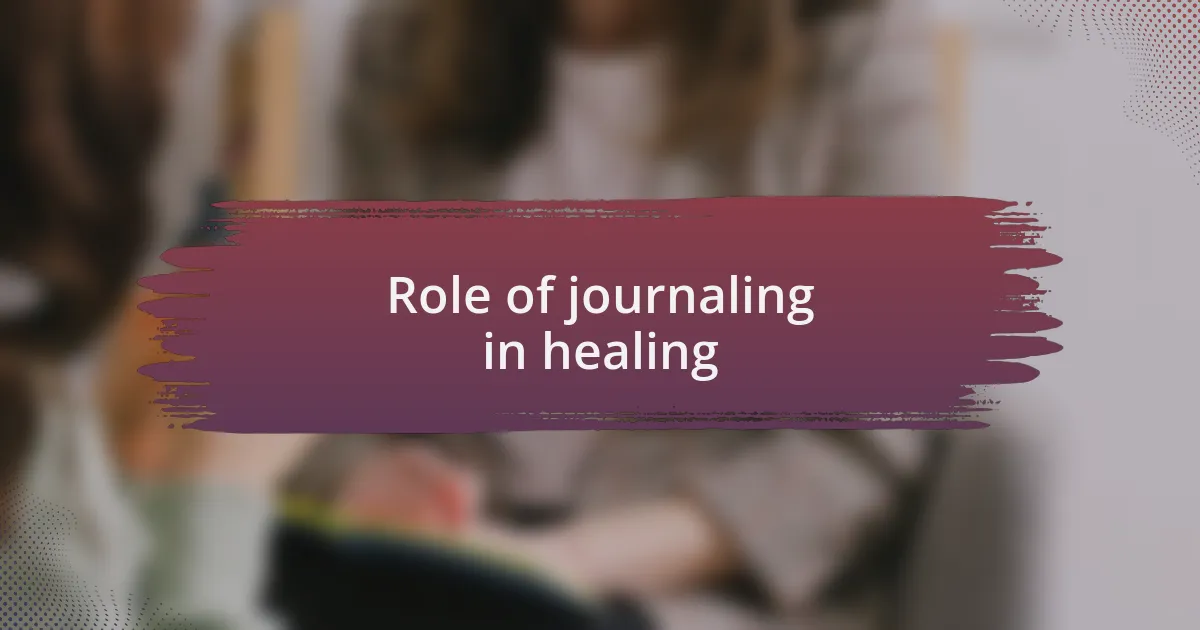
Role of journaling in healing
Journaling plays a transformative role in the healing process, serving as both a release valve and a guide. There have been nights when the heaviness of my thoughts turned into a cascade of words spilled onto the pages. In those moments, I often pondered, “What if these words could lead me to answers?” This act of writing becomes a conversation with myself, where clarity emerges from the chaos of my emotions.
As I engaged in this practice, I noticed an interesting pattern—writing about my fears made them feel less intimidating. I remember a particular instance when I noted down the fears surrounding my trauma. When I revisited those entries, my perspective had shifted. It was enlightening to see how simply naming those fears diminished their power over me, revealing them as mere shadows rather than monsters.
In my experience, journaling provides a sanctuary where vulnerability can flourish. I once documented a painful memory that had haunted me for years, laying it bare on the page. To my surprise, that act of acknowledgment not only lessened its grip on my heart but also invited healing energy back into my life. What if this simple practice could be your stepping stone toward reclaiming your narrative? I’m convinced it can be—a personal roadmap, guiding us through the often tumultuous terrain of recovery.

Benefits of journaling for trauma
Engaging in journaling has offered me a profound way to connect with my inner self, especially during tumultuous times. I recall a period when the weight of past traumas felt overwhelming, and through writing, I began to uncover layers of my feelings that I didn’t even realize were buried. Can you imagine unearthing those emotions? It can be like discovering hidden treasures of insight that help us understand our reactions and patterns more clearly.
Another benefit I’ve experienced is the way journaling allows me to track my progress. Reflecting on earlier entries often gives me a sense of empowerment. I remember a time when I flipped through my old notebooks and noticed how my perspective on certain incidents had shifted over time. Seeing that evolution reminded me that healing is not linear, and that’s okay. Have you ever looked back and realized just how far you’ve come?
Moreover, writing can be a cathartic release; those moments when I felt like I could explode from pent-up emotions were often alleviated by simply putting pen to paper. One particularly tough night, I scrawled my feelings without any filter or concern for grammar. The relief that washed over me afterward felt like a wave, pulling away the tension I didn’t know I was carrying. It’s amazing how journaling can serve as a safe space for expressing emotions that might feel too daunting to articulate aloud. If you haven’t tried it yet, why not give it a go? It could surprise you with the clarity it brings.
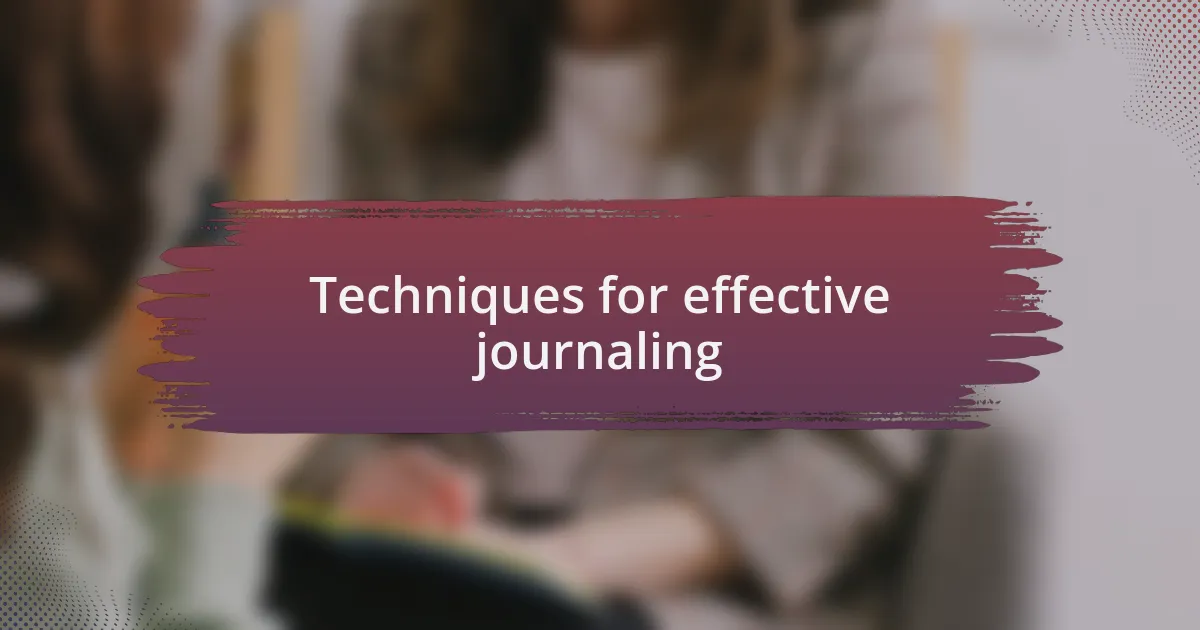
Techniques for effective journaling
When I journal, I find that setting a specific intention can tremendously enhance the clarity of my sessions. For instance, on days when my mind feels particularly chaotic, I focus on a specific question, like “What am I feeling right now?” This guided approach encourages me to dive deeper into my emotions, rather than getting lost in a whirlwind of thoughts. Have you ever tried defining a purpose for your writing? It can make a world of difference.
Another technique that works wonders for me is incorporating sensory details into my writing. I vividly recall sitting outside with a cup of herbal tea, describing the warmth of the sun on my skin as I explored my feelings about a recent confrontation. Engaging the senses not only grounds me in the moment but also evokes stronger connections to my experiences. What about you? Have you ever noticed how the sights and sounds around you can influence your mood?
Lastly, I’ve discovered the power of free writing. I often set a timer for ten minutes and write continuously, without worrying about spelling or structure. This approach has led me to unexpected revelations. During one intense session, I stumbled upon feelings of guilt that I hadn’t recognized before. Does it surprise you how much can emerge when we allow ourselves to write without boundaries? Freeing the mind in this way can often lead to profound self-discovery.
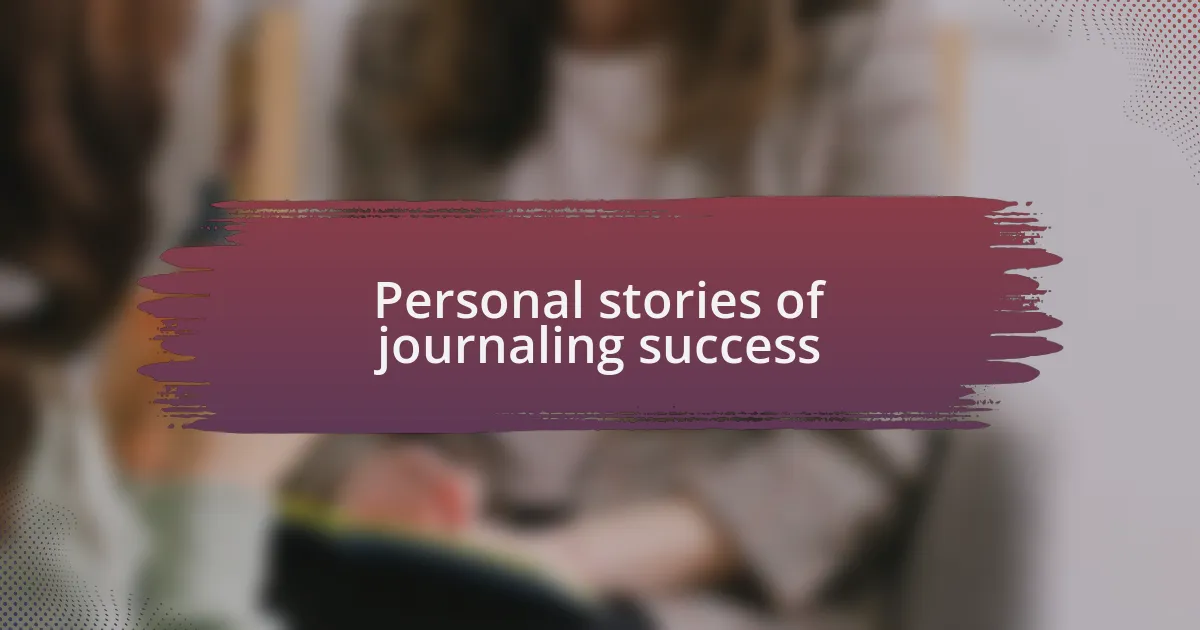
Personal stories of journaling success
Personal stories of journaling success can be incredibly powerful. I remember a time when I was overwhelmed with anger after an incident triggered memories of past abuse. I decided to pour my heart out onto the pages without holding back. What surprised me was how quickly the act of writing transformed my emotions. By the end of that session, I felt lighter and more empowered to address my feelings constructively. Have you ever experienced such a cathartic release through journaling?
One of my friends shared how journaling helped her navigate feelings of isolation after leaving an abusive relationship. She dedicated her writing to her struggles, each entry detailing moments of vulnerability and strength. Over time, she noticed a shift in her narrative. Instead of solely focusing on pain, she began to celebrate small victories. It’s fascinating how the act of journaling can change our perspective, isn’t it? Reflecting on our growth can be just as healing as expressing our pain.
I once facilitated a journaling workshop where participants shared their most significant insights. One participant described a moment of clarity while revisiting childhood memories. Writing about those experiences allowed him to identify how they shaped his responses to current challenges. Hearing his journey made me realize the profound impact journaling can have on self-awareness. How has journaling brought clarity to your life?
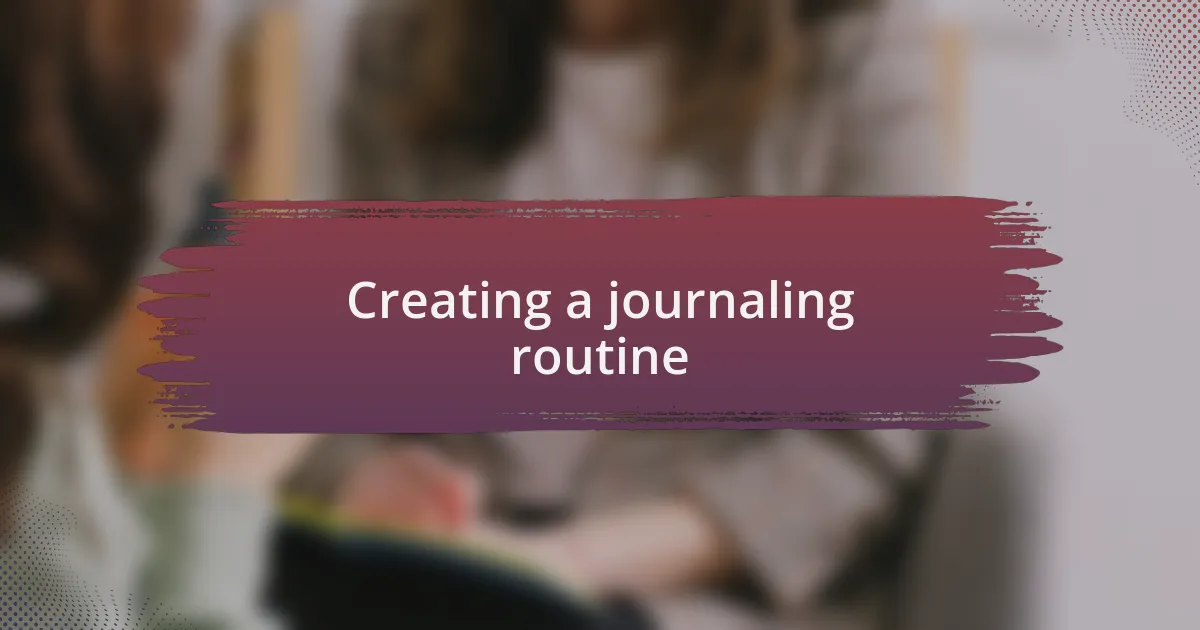
Creating a journaling routine
Establishing a consistent journaling routine can feel daunting at first, but I’ve discovered that setting a specific time each day can make all the difference. For me, evenings have become sacred; it’s my moment to reflect on the day’s events and my feelings about them. Do you have a preferred time? Just remember, it’s about what feels right for you.
When I started, I found that having a designated space helped create a calming atmosphere. I chose a cozy corner in my home, free from distractions, where I could fully immerse myself in the writing process. Setting the mood, whether through soft lighting or my favorite scented candle, allowed me to focus and feel safe—key elements when unpacking such sensitive emotions. Have you thought about where you feel most comfortable journaling?
I also learned to approach my journaling sessions with flexibility. Some days, just a few lines of feelings are enough, while other times, I might write for an hour. Embracing this ebb and flow in my routine has made journaling a source of joy rather than a chore. What about you? Could flexibility help alleviate any pressure around your journaling practice?